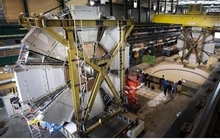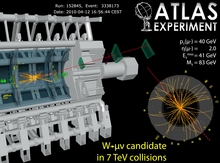Office Hours: Mondays, 10 AM - 12 PM and 1:30 PM - 6 PM in SCI 132
Research Interests:
Interactions of Particles and Matter.
My primary focus is on the interactions of particles with matter. I have developed and built magnetic spectrometers for cosmic ray physics above the atmosphere, and he designed and built precision muon tracking detectors for ATLAS, which played an important role in the discovery of the Higgs boson. In addition, I have recently joined the Dark Energy Spectroscopic Instrument collaboration (DESI), where I am working on the construction of the focal plane instrument. Among other things, this will enable the measurement of the expansion rate of the universe over the past 10 billion years, with the goal of distinguishing various models of dark energy. I am currently directing two BU graduate students on DESI, who are working on simulations and analysis of data involving the Lyman alpha forest, and on protoDESI, a prototype detector that will be mounted on the Mayall telescope in the summer of 2016.
Selected Publications:
“Observation of a new particle in the search for the Standard Model Higgs boson with the ATLAS detector at the LHC,” ATLAS Collaboration, Physics Letters B 716, 1 (2012).
“Atmospheric Neutrino Flux Measurement Using Upgoing Muons,” S. Ahlen et al. (MACRO Collaboration), Phys. Lett. B 357, 481 (1995).
“An Antimatter Spectrometer in Space,” S.P. Ahlen et al. (AMS Collaboration), Nucl. Instr. and Meth. in Physics Research A350, 351 (1994).
“A New Limit on the Low Energy Antiproton/Proton Ratio in the Galactic Cosmic Radiation,” S.P. Ahlen et al. (PBAR Collaboration), Phys. Rev. Lett. 61, 145 (1988).
“Limits on Cold Dark Matter Candidates from the Ultralow Background Germanium Spectrometer,” S.P. Ahlen, F.T. Avignone, R. Brodzinsky, A.K. Drukier, G. Gelmini and D.N. Spergel, Phys. Lett. 195B, 603 (1987).
For a full list of publications, please see the attached CV.
Education:
- Ph.D. - University of California at Berkeley 1976
- BS, MS - University of Illinois at Chicago 1970, 1971
Honors/Awards:
- Alfred P. Sloan Research Fellowship
In the news:
- CERN experiments observe particle consistent with long-sought Higgs boson
- Professors Ahlen, Lane, Shank and students discuss the LHC in The Daily Free Press
- The Large Hadron Collider: it's live
Research Descriptions:
The ATLAS Experiment at CERN
The ATLAS experiment is a large detector system developed by a collaboration of physicists from around the world to study very-high-energy proton-proton interactions at the Large Hadron Collider (LHC) at CERN, a laboratory for high energy physics near Geneva, Switzerland. Boston University personnel were involved in the construction and installation of the muon detectors for ATLAS. The detectors occupy a region the size of a five-story building and measure the trajectories of muons in a magnetic field with a precision of better than 1/10 of a millimeter. This permits precise determination of the muon momentum which is an important ingredient in searches for new phenomena at the TeV energy scale. Boston University has also played a leading role in the development of computing and analysis tools.
 Physics (Internal)
Physics (Internal)


